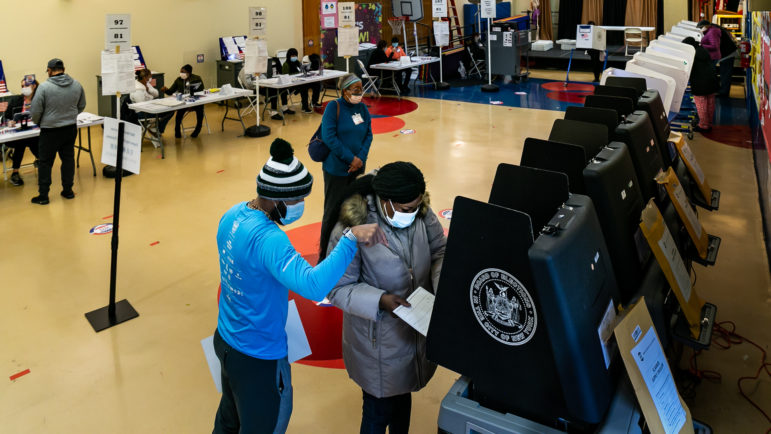While turnout was not particularly high across the city, GOP wins signal that moderate and conservative voters were pushed to the polls in key districts, perhaps propelled by a rejection of more progressive proposals that have become mainstream, like diverting money from the police department.

Adi Talwar
A voter being assisted Tuesday morning at PS 94 Kings College School in The Bronx.While New York City’s general election for mayor culminated in a not-so-surprising win for Democratic Eric Adams this week, select races in the five boroughs were far more competitive and had more unexpected outcomes.
In Queens, the GOP fended off a formidable challenge from school teacher Felicia Singh, a Democrat endorsed by Gov. Kathy Hochul and both Sens. Chuck Schumer and Kirsten Gillibrand. Joann Ariola, the borough’s Republican party chairwoman, won the election Tuesday with around 68 percent of the votes in District 32, holding one of the final three GOP-controlled council districts in the city and the sole Republican Council seat in Queens.
“I know what my neighbors want, as these election results prove,” Ariola said in an emailed statement to City Limits on Thursday. “They want safe streets, clean parks, thriving businesses, and quality education and I’m going to fight for those things in the Council. They do not want the progressive socialism that’s hurting our city’s quality of life and they have resoundingly rejected it this week.”
The district, currently represented by Republican Eric Ulrich, includes Ozone Park, Richmond Hill and the Rockaway peninsula. In a statement posted Wednesday, Singh conceded.
“I ran for all of our communities because I knew we deserved so much more,” said Singh, who won over four other Democrats in the June primary, the first Guyanese and Punjabi New Yorker to do so, she said. “I ran to include people who had never been part of our electoral process at all. Folks who felt erased and neglected year after year after year. If you connected with someone else, or if you felt seen or known on this campaign—that is what we set out to do—to change the narrative of this district. We belong here.”
Republicans also maintained their control of the Staten Island borough president’s office, with Vito Fossella triumphing over Democrat Mark Murphy with around 62 percent of the votes there. The GOP also retained mid-island Council District 50, with Republican David Carr emerging victorious over Sal Albanese, who ran as a Democrat.
While turnout was not particularly high across the boroughs, according to unofficial BOE figures—1,022,802 votes were cast in-person for mayor, in a city with more than 5.5 million registered voters—the GOP’s wins signal that moderate and conservative voters were pushed to the polls in key districts, perhaps propelled by a rejection of more progressive proposals that have become mainstream, like diverting money from the city police department.
Three other Council districts could or are likely to flip from blue to red. In south Brooklyn’s 48th district, Republican Inna Vernikov is poised to easily win the vacant seat over Democrat Steven Saperstein; in Queens’ District 19, conservative candidate Vickie Paladino—whose campaign website decries the “radical political elements who threaten to tear our city apart”—declared victory Wednesday over Democrat Tony Avella (unofficial BOE results list her as winning nearly 50 percent of votes to Avella’s 43 percent).
And Democratic City Councilman Justin Brannan, who represents Brooklyn’s 43rd District, is competing in a still-too-close-to-call race against Republican Brian Fox (early BOE tallies show Fox leading with 50.44 percent of votes to Brannan’s 49.39 percent. “Reports of my demise have been greatly exaggerated,” Brannan wrote on Twitter Wednesday. “We will be fine. We just need to count every damn vote!”)
Still, the incoming City Council remains overwhelmingly Democratic, and will include two candidates—Tiffany Cabán in Astoria and Alexa Avilés in Sunset Park—backed by the Democratic Socialists of America. The new Council is also set to grow more diverse, with its first Muslim woman elected and two Korean American representatives, among other firsts for the legislative body.
Voters on Tuesday also rejected ballot proposals aimed at changing the state redistricting procedure following the Census, and others to enable same-day voter registration and no-excuse absentee voting. Proposals that would increase the jurisdiction of the New York City Civil Court and that affirm the right to a clean environment passed.
In other interesting contests:
- Kristin Richardson Jordan, the socialist upstart who won the crowded June Democratic primary against veteran politician Bill Perkins for Council District 9, which includes Harlem, won the general election there on Tuesday with around 94 percent of the vote. “It’s really exciting that what some politicos thought was impossible the people of Harlem thought was possible,” Jordan told City Limits on Tuesday, as she met with residents of the district and handed out sandwiches near a polling site.
- Also in Harlem, Cordell Cleare, Councilmember Bill Perkins’ former chief of staff who ran for the CD 9 seat in June, emerged victorious in the special election for State Senate District 30, previously held by now Lt. Gov. Brian Benjamin.
- Yudelka Tapia won the special election for the west Bronx Assembly seat vacated by resigning Assemblymember Victor Pichardo.









